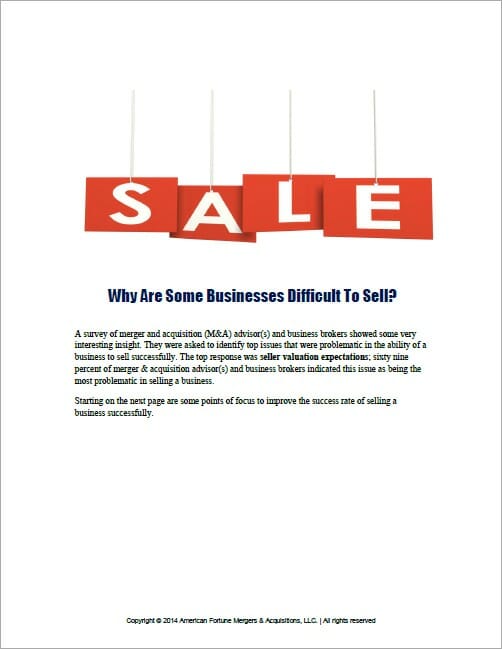
Help in Selling a Business
The following is a practical guide to selling a business, it provides an overview, advice, and process for successfully selling a business with the help of m&a or business brokerage firm.
The initial steps to selling a business should consider the following questions:
• Is the business prepared for the selling adventure in the market?
• Will buyers find the business attractive as a good investment?
• How much is the business worth in the open market
• How to prepare, launch and navigate the business sale process?
• What’s involved in dealing with buyers, negotiating, due diligence?
The guide provides practical information in selling a business with the help of a m&a or business brokerage firm .
The help guide will provide:
• An overview of the sale process
• Ways of preparing a business for sale
• Marketing information in the sale of a business
• Advice on dealing with buyers, due diligence, deal structuring and business sale negotiations
• Guidance on using help from Merger & Acquisition expert and experienced consultants
• Recommended resources to market and to help in selling a business successfully
• How to maintain confidentiality during the selling process
Confidentiality in a business sale: During the various stages of the selling a business the buyer may request documentation on the business that is very confidential. The best approach is to piece meal confidential information after the buyer has earned the right to such information. Information such as customer lists, very confidential supplier contracts or employee records should shared with buyers towards the end of the buyers due diligence process as well as after a preliminary agreement to buy the business is signed. Treat all buyers with suspicion since some buyers are simply looking for information to start a business or to use the information for competitive advantages. The buyer needs to good reasons for requesting very confidential information. The seller needs to perform their own research on the buyer to better gauge the fit and qualification of the buyer to make an acquisition and to operate the business successfully. Make sure in the early stages of the selling process that a buyer is financially qualified based upon their financial statement. Keep in mind though that a buyer needs access to basic information about the business before they are in a position to make a intelligent offer. In the sale of a business, confidentiality is critical. If employees, competitors, customers, suppliers and others find out that the owner is selling a business, the consequences can be extremely negative, well beyond simply putting the business sale at risk.
Business Sale Options
Selling to an existing partner:
Selling opportunity, the process might be easy if the current partnership has a buy-out agreement in place. Depending on circumstances, the sale of a business to an existing partner allows a straightforward route for selling a business and likely resulting in little disruption to customers, employees and others.
Selling to another company:
Selling opportunity, many companies and private equity groups regularly acquire businesses for strategic reasons. They acquire businesses to expand the capabilities, market reach, competitiveness and profitability of an established rather than building a business from ground up. Sale a business to a larger company allows for the possibility of a higher sale price.
Selling to an individual:
Selling opportunity, Individuals buy a business rather than start businesses to avoid start-up risk, to enjoy the immediate benefits of sales and cash flow, and to benefit from established systems, customers, and reputation. Additionally if the seller offers some seller financing, it increases the chances of the buyer obtaining bank financing. For smaller businesses selling to a individual buyer is often the only option of selling a business since other businesses and equity buyers are seeking to acquire medium to large size businesses.
Help in transitioning a business to next generation family members:
Selling opportunity, currently approximately a little over twenty percent of businesses are transferred to the second generation. This approach can be a good solution for selling a business but careful review and planning is critical if both the sellers and buyers are to create a win-win outcome. Selling a business with little down payment plus a lot of seller financing it rarely achieves a top selling price and much risk in the seller (parent) being paid all most of the balance on the seller financing. This situation may leave the seller (parent) unable to retire comfortably. On the positive note employees, customers and supplies benefit from continuity of family ownership and the seller’s dream of having built a legacy is more likely to be preserved.
Selling to a key employee:
Selling opportunity, this sale approach is somewhat similar to selling to family members (children). The employee usually cannot afford to make a sizable down payment so the seller is faced proving significant amount of seller financing with the risk that the employee will not be able to pay back the balance. Similar to the sale to a second generation family, selling a business to an employee rarely achieves a top price. The benefit of business sale to an employee allows the seller flexibility in future involvement and this option provides ongoing continuity for employees, customers, suppliers and others.
Selling with Employee Stock Ownership Plan (ESOP):
Selling opportunity, a sale to employees involves a tax-qualified, defined employee benefit plan, called an Employee Stock Ownership Plan (ESOP). This approach allows employees to buy shares of the business quickly or over a long period of time, depending on how the transition is structured. Setting an ESOP is quite complicated and requires much legal planning and help. It can be a win-win for both the seller and the employees since the selling approach may be tax free. The ESOP process allows a slow phase out of the owner’s involvement and help in providing ongoing continuity for employees and customers.
How to liquidate a business:
Selling opportunity, liquidation is simply the sale of physical assets and inventory. This is normally not the ideal way of selling a business and is usually applicable when the business is not profitable and or the products or services are no longer useful in the market place. This approach will result in relatively quick liquidation of assets and closing of the business.
How to merge with another business:
Selling opportunity, a merger occurs when two businesses agree to combine their two businesses into a single new company rather than remain separately owned and operated. Most mergers take place with businesses that are usually similar in size. Both companies’ stocks are surrendered and new company stock is issued in its place. Merging with another business is sometimes a possibility but it is a difficult undertaking mostly due to power and emotional issues by both sides. This approach also involves much legal and accounting assistance which very often results in much disagreement and in turn to resulting in the sale falling apart.
Initial Public Offering (IPO):
Selling opportunity via an IPO not usually for someone wishing to retire it is primarily used for fast growing companies who are seeking to raise money. In a IPO shares of in a company are sold to the general public for the first time and the company becomes a publicly traded business. An IPO is not for everyone because it is costly and complicated endeavor. Since the owner is typically used to calling all of the shots and not used to sharing power carefully consideration needs to be given to an IPO.
The Business Sale Process Overview
Businesses are sold via two different ways, as an Asset Sale or a Stock Sale.
Selling a Business via an Asset Sale: This is the most common forms of selling a small to midsized business. In this deal structure the seller keeps the legal business entity and sells the business as a ‘going concern” with tangible and intangible business assets including customers, employees, business name and all of the good will of the business. In an asset sale the seller is not selling stock of the company (business). The buyer normally acquires a debt free business and does not receive the cash in the business or the receivables. Additionally the buyer does not assume any liabilities including legal liabilities of the business.
Selling a Business via an Stock Sale: This is sale of a business whereby the owner of a corporation sells its stock or the owner of an LLC sells its membership shares. With the sale of stock or membership sales, the sale of stock also includes all business assets and liabilities that aren’t specifically excluded. Selling a business in the form of a stock sale is much more complicated and results in a lengthier and more complicated due diligence process with much help in the sale of a business from M&A consultants. From a taxation perspective its more advantages for a seller to sell their business via a stock sale however most buyers will very often acquire a business as a asset sale to avoid spending enormous amount of time and money on due diligence process and great amount of help from attorneys and accountants. Additionally the buyer assumes all liabilities including legal liabilities of the business. As a result majority of small to midsized business end up selling as a asset sale.
Once the preparations for selling a business have been made, the business exit strategy in place and an ideal buyer(s) category identified, it’s time to start marketing the business for sale. This is the point when the selling process goes into full steam. This portion of the process starts with carefully screening prospective buyers to confirm their i financial and operational capability, sharing details of the business for sale, facilitating due diligence by the buyer, and negotiating hundreds of points and issues and deal structuring in hopes of selling a business at the expected price and terms. The time frame for this process may range from 3 to 9 months with a buyer only to have the deal fall apart and having to start the process all over again. No doubt this process is very time consuming and exhausting and many business sellers find it difficult to keep their enthusiasm high as they deal with picky and demanding buyers.
The following is a quick summary of the business sale process:
1. Buyer contact
2. Buyer screening process
3. Buyer deemed qualified, signs confidentiality agreement
4. Business identified, Selling Memorandum presented to buyer
5. Buyer performs preliminary due diligence
6. Buyer issues an Offer to Purchase with contingencies
7. Preliminary negotiations and agreement on key issues
8. Buyer conducts full due diligence
9. Ongoing negotiations and sale structuring
10. Closing sale documents preparation
11. Preparations for ownership transfer
12. Closing and ownership transfer
In most cases the sale of a business, the most complicated and critical areas that makes or breaks a sale is in the Due Diligence process. Up to the time of the full due diligence the seller and the buyer were on a honeymoon but things are about to change. The buyer along with their team of consultants very often leave no stone unturned. The due diligence process consist of research, investigation and review as the buyer and their team seek to fully understand the condition of their business through a review of all financial records and obligations such as debts, pending or potential legal issues, leases, warranties, long-term customer agreements, employment contracts, compensation agreements, supplier and distributor agreements, and much more. Additionally as the buyer and their team uncover issues and concerns they are quick to ask for a price concession. A seller that has armed themselves with a good Merger & Acquisition or Business Brokerage consultant to help in preparing their business for sale, will see their preparation pay off.
The sale of a business may take between 6 to 18 months depending on many variables such as business type, sale price, terms, availability of financing, buyer activity, the state of the economy and other factors. Unfortunately not all businesses end up selling, very often as a result of unreasonable selling prices, all-cash demands, unattractive business conditions, poor financials, lack of documentation, and undocumented processes and procedures.
One of the most critical things in successfully selling a business is to carefully and thoroughly prepare the business for sale as well as soliciting Merger and Acquisition experts to help in selling a business successfully. The result may just be luck, but luck is sometimes referred to as “when preparedness meets opportunity”.
To learn more about more about Mergers & Acquisitions (Business Sale & Acquisitions) click on the following links: Alliance of Merger & Acquisition Advisors® (AM&AA); Association For Corporate Growth; Merger & Acquisition Source; International Business Brokers Association (IBBA); Mergers, Acquisitions and Business Transfers.
American Fortune has provided successful help in selling a business in most areas of the USA






